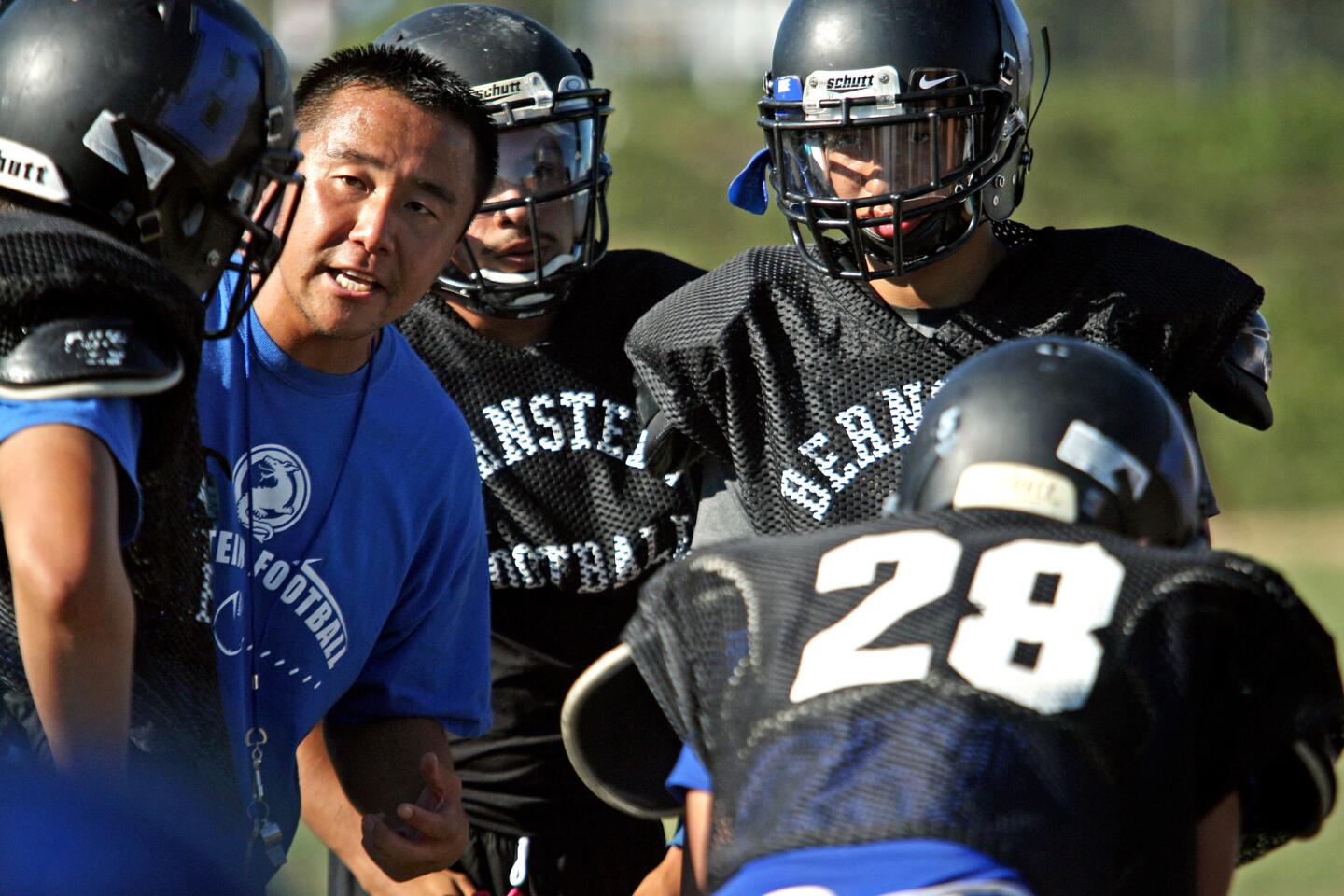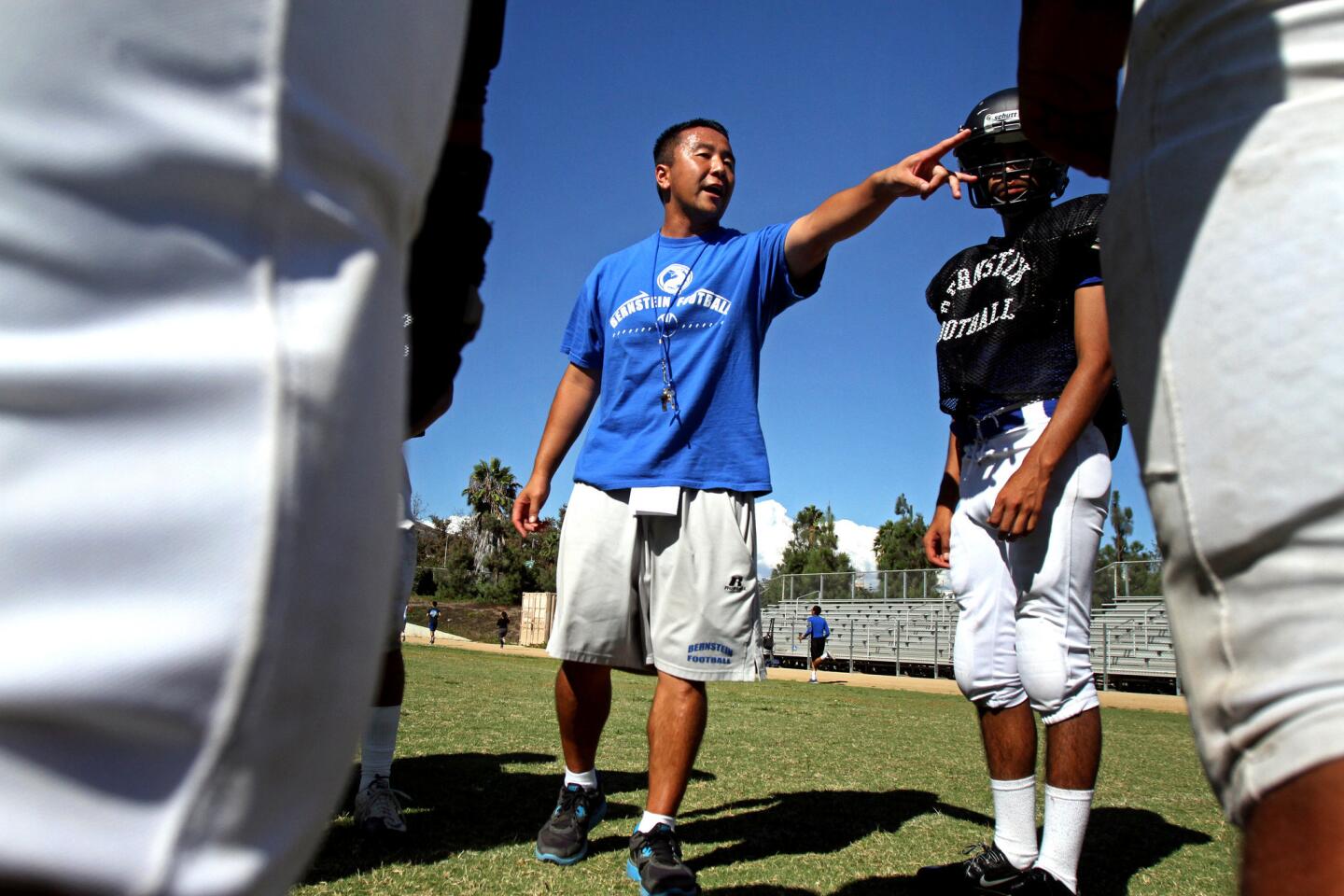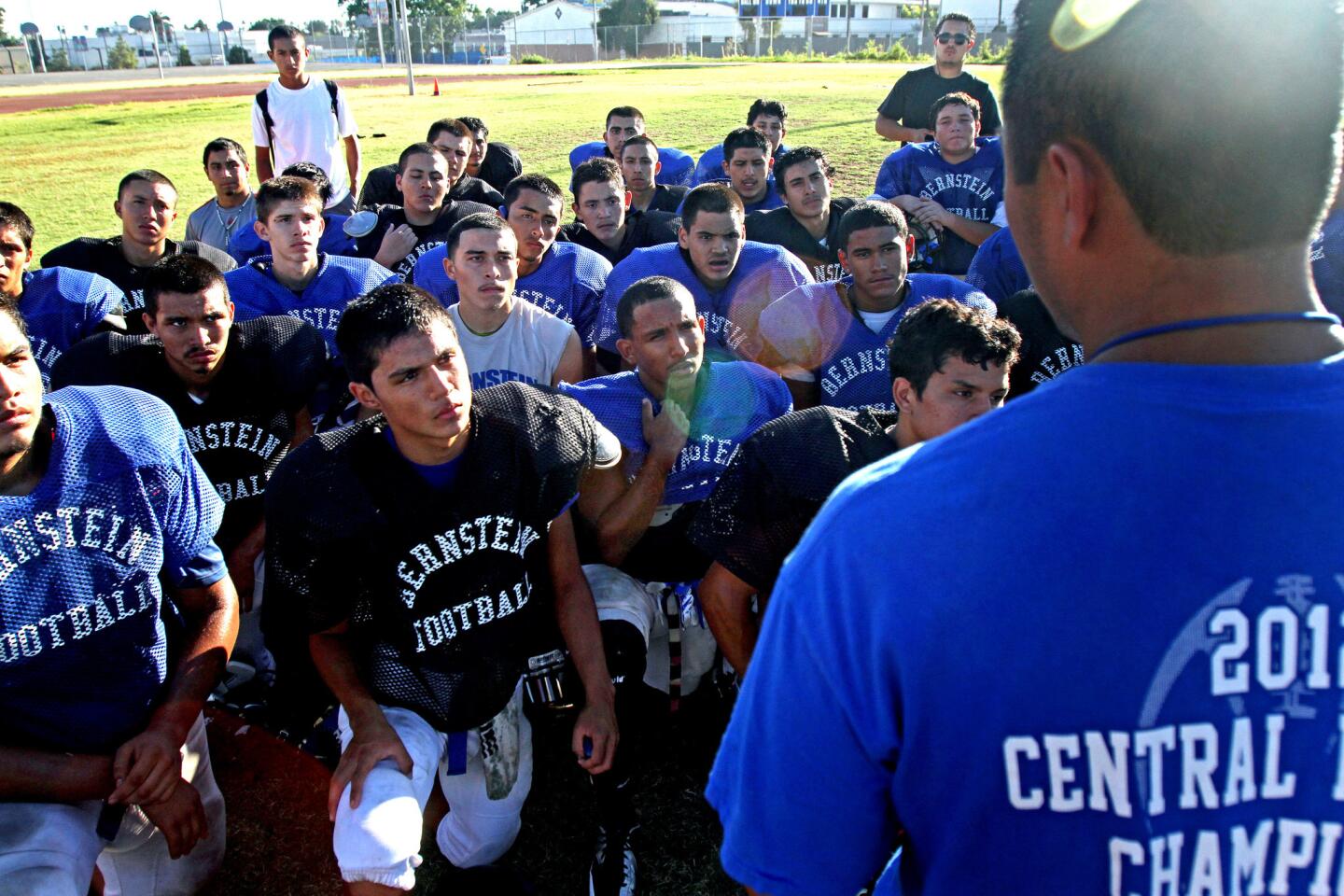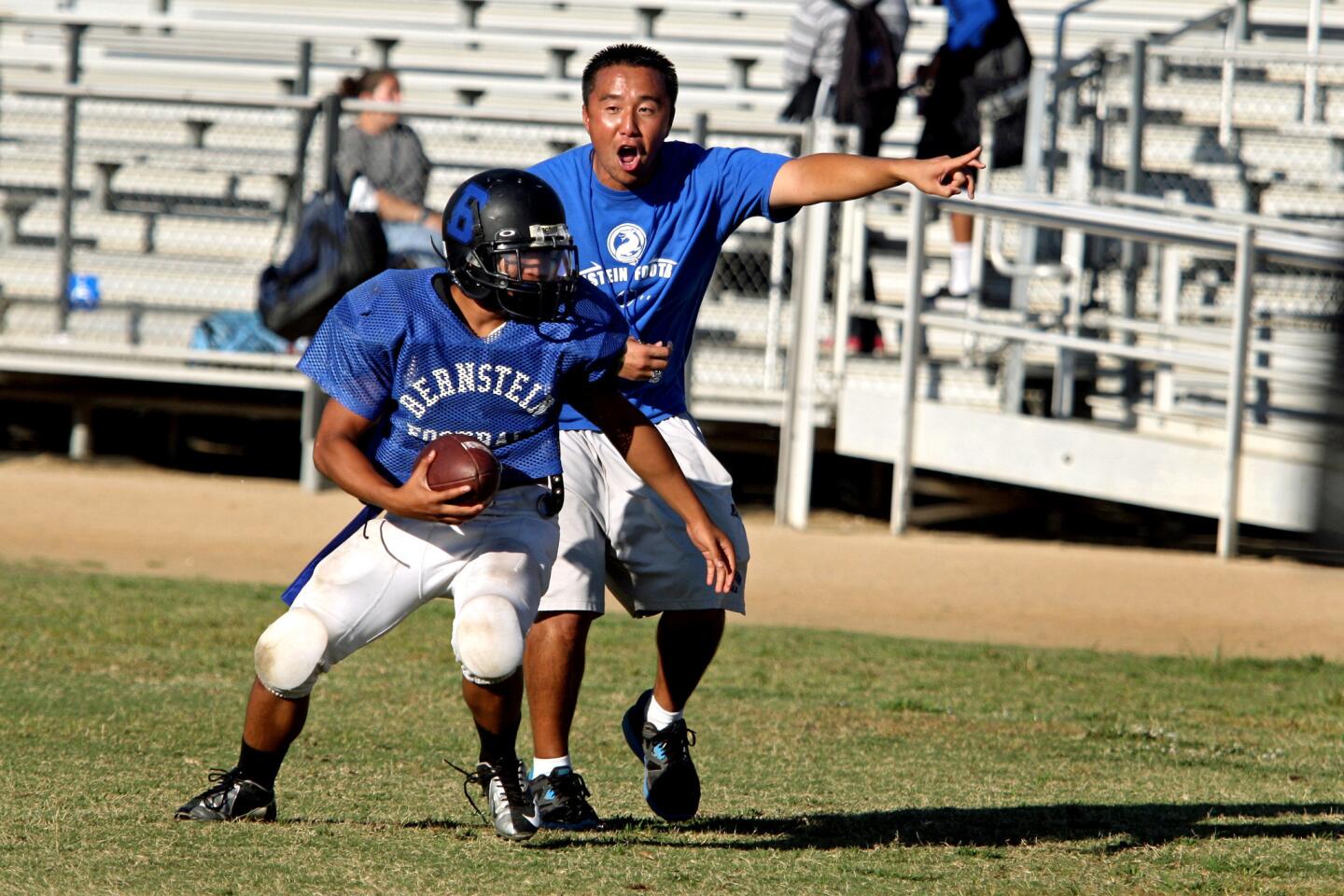Bernstein High football players earn letters — of parents’ love
Damian Sanchez was downcast. It was the day after his football team’s first loss of the season, and the senior defensive back from Hollywood Bernstein High was having a tough time shaking the disappointment.
After a team meeting, he returned to the one-bedroom apartment near Koreatown he shares with his mother and two younger brothers, took a shower, then opened the door to a closet to reach for a clean shirt.
That’s when he was once again drawn to the piece of paper taped to the wall next to his clothes. He paused to read the handwritten words.
“I want to tell you that from the moment you were in my belly, I loved you dearly. I love you then, today and always. You are my world, my everything. Without you, there’s no me.”
It was a letter from his mother, Myrna, and it had the desired effect.
“I see it every day in the morning before I go to school,” said Damian, 17. “It makes me think everything will be fine.”
Myrna Rivera was a teenager herself when she became a mother. Now she puts in long hours as an office worker to support her family, and there is little time to rest, let alone collect her thoughts and write a letter to her boy about how much she loves him.
A request from Damian’s high school football coach coaxed her into expressing her feelings and transformed the relationship she has with her son.
Bernstein Coach Masaki Matsumoto was raised by a single parent and knew firsthand the value of feeling loved. He came to the United States from Japan with his mother, Keiko, when he was 7. “It was just her and I,” he said.
Matsumoto, 31, estimated that 60% of the nearly 100 players on his varsity and junior varsity teams are guided by single mothers, the reason, he added, that “my heart is so big for these kids.”
The idea for the letter, which he borrowed from coaches at Bothell High, outside Seattle, was simple: Write a letter to your son and say something positive while expressing your love. Matsumoto had written instructions to the parents delivered by their sons — 70 in Spanish, 30 in English, each containing a blank piece of notebook paper.
Once written, the letters were returned in sealed envelopes to Matsumoto by the players, who had no idea what was inside.
When they found out, the reaction was more than anyone imagined.
Damian hand-delivered the envelope to his mother while she was preparing dinner.
Her immediate reaction wasn’t positive. “Oh my God, I have to do homework for my kids? I have to do this?” she recalled thinking.
She stuck Matsumoto’s letter in a desk drawer, where it stayed for about a week. Then, one night as she lay in bed, she started thinking about Damian and recalling how at 18 she was not prepared to be a mother when he was born.
She was a teenager and wanted to act like one rather than to always be responsible for a baby. As he grew older he noticed, and felt abandoned.
“I was there, but going out with my friends,” Rivera said. “He was 5 and remembers. He felt I didn’t love him.”
So she pulled out a pen and poured her emotions onto the piece of blue-lined paper.
“I admire your efforts to be a better person. I am happy to have you in my life, though I know sometimes I may get on your nerves, but I just want you to know that all your dad and me want is a better life for you.”
Damian’s father is in prison, and the boy had been acting out, arguing with his mother, drinking alcohol and staying out well past his curfew. But lately he had been trying to do better and was getting mostly A’s and Bs in school. His mother was proud of him, but hadn’t really told him that.
“In the real world, you come home, you cook, you have two other children that have homework. When do you have time to sit down?” Rivera said. “You should say, ‘I love you,’ but we forget.”
Bernstein High is across the street from KTLA-TV Channel 5 studios, and the Hollywood sign, not too far away in the hills, can be seen from the football field.
When 45 varsity football players arrived at the school’s gymnasium in July, they anticipated performing conditioning exercises. Instead, each was handed an envelope and told to find a quiet spot where he could read what was inside and reflect.
What happened next took everyone by surprise. For the next 15 minutes or so, wherever Matsumoto looked he saw players sobbing — against walls, in corners, bent over in chairs.
“I’ve never seen anything like it,” said Shalls Jacome, the team’s 22-year-old offensive coordinator.
Cesar Orozco, a senior offensive lineman, broke down when he read what his mother had written in Spanish: “You know deep inside I love you. And you’re the most important thing in my life. You know I would die for you.”
“I don’t really get told that at home,” Cesar said. “For me to be reading that, it really touches me.”
John Mercado, a sophomore lineman, sobbed so hard reading his mother’s letter that he had to pause before finishing. He had come close to quitting the team when his parents lost their jobs and needed financial help.
His mother wrote in Spanish: “I’m very proud. You’re the nicest kid I’ve ever raised and during hard times you don’t ever ask for anything.”
Matsumoto then gathered the players together and asked whether anyone wanted to share their thoughts and make a commitment to the team. One by one, players stepped forward.
A lineman revealed that his father was an alcoholic. Sick in the hospital because of his drinking, his father had made him promise to compete in a sport. “That’s why I’m on the team,” the boy said. He had quit sports before. He said he wouldn’t do it again.
A running back said the reason he wore the same clothes to school every day was that his family was poor. His father was unemployed, and the boy had considered him lazy and uncaring. His father’s letter changed that opinion, showing him he really was loved.
Matsumoto seized on what he saw as a teaching moment. “Hey, you guys know you’re loved,” he told them. “Not just at home, but here. You have a family here. Any struggles you’re going through, you have a family here and at home.”
Matsumoto played football at a Seattle high school and in college at Trinity International near Chicago. He earned a master’s degree in special education from Point Loma Nazarene.
When Bernstein High opened in 2008, he was hired as a special education teacher, and became an assistant football coach for varsity teams that had records of 0-9, 1-8 and 1-9 the first three seasons. After one year at another school, Matsumoto returned to Bernstein last season as the head coach, and his team went 8-3.
But he’s never judged his success solely by wins and losses.
“If your goal is to win, you’re never going to fulfill that every year,” he said. “But if your goal is to change lives and be a positive impact on them and help them become better people, then I believe that’s a win, and the wins on the scoreboard will come with that.”
After a loss to Sun Valley Poly High in the second game of this season, Bernstein’s Dragons have won eight in a row and will enter the Los Angeles City Section Division III playoffs Friday with a record of 9-1.
Whether the season ends in a championship or not, Matsumoto has met his goal of reconnecting players with their parents.
“I told the parents in my letter that as a young man growing up without a father it helped me that my mom told me she loved me and supported me, and the coaches I had cared,” he said. “That gave me the motivation to keep going, and I wanted them to do the same for these kids.”
Rivera was resting on her bed after a 10-hour workday when Damian entered the room. She recalled that his eyes were red and swollen and she suddenly became alert with concern.
“What’s wrong?” she asked.
Damian was just returning from that July practice.
“Mom, I love you,” he said.
“I love you, too,” Myrna said, “but what’s wrong?”
He started to cry. “Thank you for my letter,” Damian replied, and then he kissed her.
More to Read
Get our high school sports newsletter
Prep Rally is devoted to the SoCal high school sports experience, bringing you scores, stories and a behind-the-scenes look at what makes prep sports so popular.
You may occasionally receive promotional content from the Los Angeles Times.












